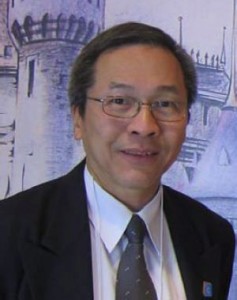Former refugee shortlisted for the Nobel Prize

Dr San Than, shortlisted for the 2014 Nobel Prize for Chemistry
A refugee from Vietnam who survived a perilous voyage across the South China Sea in a small boat and whose first job in Australia was labouring in a boat shed has been shortlisted for the Nobel Prize for Chemistry.
Dr San Thang, an organic chemist with the CSIRO, was shortlisted with colleagues Dr Ezio Rizzardo and Dr Graeme Moad.
Dr Thang’s journey from bedraggled refugee to the Nobel shortlist is as astonishing as it is inspiring.
“Sometimes I look back and even I find it all a little difficult to believe. It is very emotional for me because it reminds me of the sacrifices made and the challenges faced,” Melbourne-based Dr Thang said this week.
“Then I remember where those moments led me, to so many kind and generous people, to precious opportunities and a career I once thought might no longer have been possible,” he said.
Dr Thang and his colleagues were cited for their development of new plastics and polymers with applications across multiple fields, including solar energy, medicine and paint.
Known as RAFT (reversible Addition-Fragmentation Chain Transfer), IBM, L’Oreal and Dulux are among about 60 companies throughout the world to have taken up the technology. The research has generated about 60 patents and royalties generated by the technology are forecast to be more than $32 million by 2021.
Dr Thang’s remarkable story began in 1979 aboard a 19 metre vessel packed with 408 fellow Vietnamese refugees.
“I was 24 and had just completed a degree in physical chemistry from the University of Saigon. I was in the first stages of my scientific career,” Dr Thang said.
“But when the communist forces assumed power in 1975 I felt there was no opportunity for me. I stayed on but by 1979 I felt I had no choice but to leave. All my family stayed behind and I wouldn’t see them again for almost 20 years. It is still difficult to think of that,” he said.
“The authorities didn’t care that we were leaving. They were only interested in being paid. I handed over gold nuggets. Our lives were not a concern to them.
“We piled aboard that little fishing boat, all 409 of us, and set off for Malaysia uncertain of our chances of reaching there.
“It was a terrible, sometimes terrifying experience. I don’t know how we made it but when you survive something like that, it makes you stronger. That’s what I took from it.”
After five months in a refugee camp in Malaysia, Dr Thang was granted permission to settle in Australia and on October 18, 1979 – almost 35 years ago to the day – he landed in Brisbane and immediately set about looking for work.
His first job with a boating company made him arguably Australia’s most highly qualified labourer.
Dr Thang says the key to his future was having his Vietnamese qualifications translated into English and attested by Australian education authorities.
“That was so important. Once my qualifications were recognised, I met Professor Gus Guthrie and he offered me a role as a research assistant in Griffith University’s School of Science in Brisbane,” he said.
In 1981 Professor Guthrie offered Dr Thang to opportunity to do an honours degree with him.
“He allowed me to enrol part-time and keep my job as a research assistant.”
Dr Thang says this was typical of Professor Guthrie who became famous at Griffith because of his kindness and philanthropic spirit. Professor Guthrie died last year.
“Coming to Griffith University was a turning point in my life. I went from the factory to the laboratory. It allowed me to be what I was always meant to be; a scientist,” he said.
Australian citizenship was conferred on Dr Thang in 1982 and the following year, he completed his honours degree in organic chemistry. In 1987, he completed a PhD in organic/polymer chemistry, also at Griffith.
Earlier this year, Dr Thang, Dr Rizzardo and Dr Moad received the prestigious ATSE Clunies Ross Award, which recognises outstanding application of science and technology providing economic, social and/or environmental benefit to Australia.
“I think that what I’ve learned through the years is this: that to succeed in science requires the same qualities as to succeed in life; never be afraid of failure, always persist and never stop learning,” Dr Thang said.
“You just never know where that may lead, or the wonders to be found along the way.”
Laurie Nowell
AMES Senior Journalist












